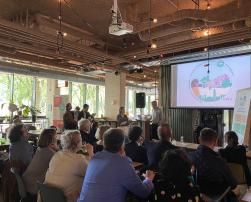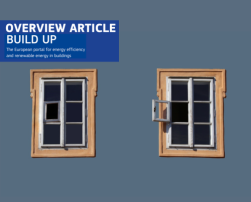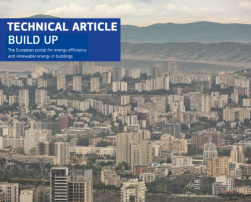
How energy-efficient are buildings in an Antarctic scientific station?
This article demonstrates how the extreme weather conditions affect the buildings' performance of two buildings at the Spanish scientific station 'Gabriel de Castilla' in Antarctica.

LIFE SUPERHERO project: permeable and ventilated roofs for sustainable living
LIFE SUPERHERO aims to diffuse the use of ventilated and permeable roofs (VPR) and HEROTILE-based roofs (HBR) as an effective climate adaptation and mitigation solutions based on 'passive cooling'.

Workshop in Utrecht explores urban renewal in post-war social housing estates
The Green Deal ARV organised a workshop on June 5 in Utrecht, NL, as a part of the World Garden City Conference, celebrated their 100-year anniversary.


Passive cooling: can we cool buildings with low to no energy consumption?
Passive cooling involves a series of strategies to cool buildings without electricity and represents an invaluable set of tools to address the increasingly intense summer heatwaves, even in Europe.

Workshop in Trento explores one-stop-shops for sustainable integrated renovation
The Green Deal ARV project aims to demonstrate and validate attractive, resilient, and affordable solutions that significantly speed-up deep energy renovations in four different climatic zones in Europe and deployment of energy and climate measures in the construction and energy industries.

Technical Article - ARISE Article series 'The Currency of Skills' # 8: Skills Fit – Energy Optimisation
Energy optimisation is a crucial aspect of modern society. As the world grapples with the challenges of climate change and the need for sustainable development, it has become increasingly important to find ways to minimise energy consumption while maximising efficiency. The key to achieving this lies in expertise. In this article, Dijana Likar and Paul McCormack explore the significance of expertise in energy optimisation and discuss how it can be harnessed to achieve optimal results.

Renovation strategy tool to achieve net zero neighbourhood
The renovation wave requires an integrated, participatory, and neighbourhood-specific approach that is customised to the local environment. A digital tool called RESTO (Renovation Strategy Tool) has been developed to help local municipalities automate calculations for comprehensive renovation strategies, by utilising public databases at the neighbourhood level.

Competitiveness of Integrated Photovoltaics: a case study on residential IPV applications
Integrated photovoltaics has emerged as key to reducing net greenhouse gas emissions across different sectors, such as building, transport, and agriculture. This article reviews the competitiveness of Building-Integrated Photovoltaics (BIPV) and Infrastructure-Integrated Photovoltaics (IIPV) in residential applications.
Heritage homes as part of the renovation marathon: spectators or dark horses?
In the article, project manager Kadri Kallast takes a closer look at the barriers homeowners need to overcome when renovating buildings placed under heritage protection and how they should be supported along the way.